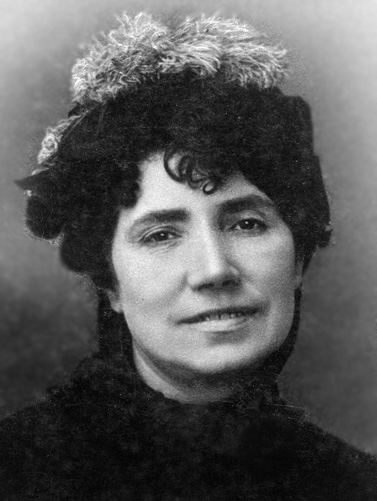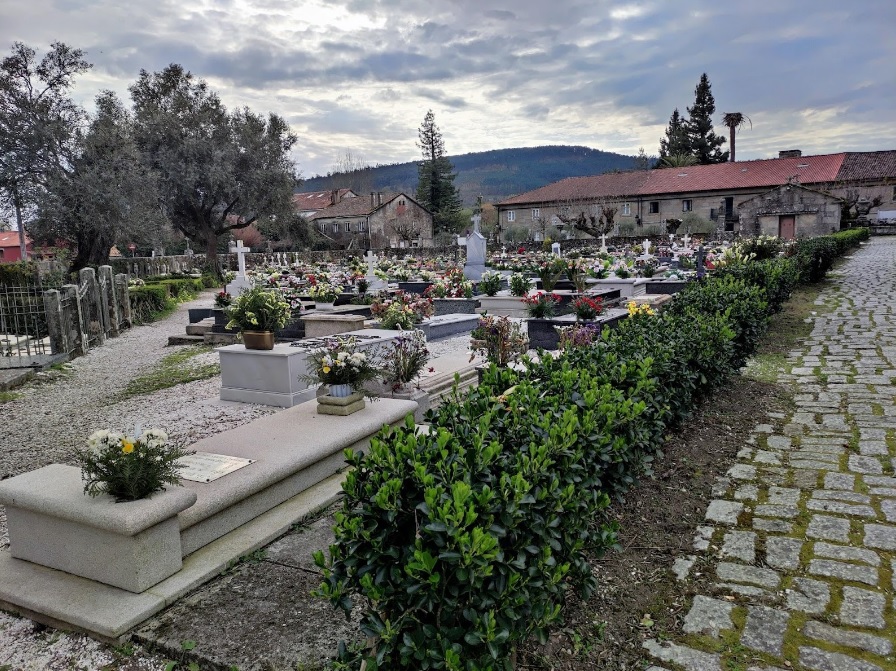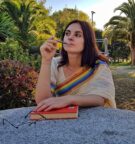
Rosalía de Castro
I arrive in the morning by train at a small stop on the regional railways. I have never been here before. There is no station as such: just the platform, and an abandoned stone house that used to be the station. Hardly anyone stops here. This is, after all, a small village. A very small village. The name is Padrón, and here Galicia’s best poet lived most of her life.
Every language has one poet whose verses have captured the imagination of their cultural and linguistic community— whose verses have become proverbs, popular songs, or even national anthems. We consider these poets the best that a language has to offer.
If you ask a non-Spaniard who is Spain’s best poet, they will surely answer the popular names: Federico García Lorca, and Juan Ramón Jiménez. If you ask a Spaniard, however, you may hear other names: Antonio Machado, Miguel Hernández, Gustavo Adolfo Bécquer. And then there are hundreds of others, names dear to general Spanish audiences, names that have passed inconspicuously beyond our borders, except for scholars in university departments, normally with offices either in the attic or the basement of the arts faculty building.
Within our borders, Spain is a conglomerate of regional sensibilities. And languages: apart from Spanish, we have Catalan, Basque, and Galician. Are poets who write in these languages Spanish poets? Certainly, they are Spain’s sons and daughters. These poets who chose to write in their regional language, rather than in Spanish, paid a price. Language played both a key role in their fame and later famelessness, unable to reach the expanse of global recognition on equal footing with their Spanish-writing colleagues.
If we speak about the Galician language, the poet that has captivated the collective imagination is, undoubtedly, Rosalía de Castro (23 February 1837 – 15 July 1885). She was also the first writer to publish a book entirely written in Galician. Her poetry simply eclipses the rest. Pop singers have adapted her lyrics, her songs are sung in local festivals, and, of course, we Galician kids have to learn several of her poems in school.
However, I wasn’t a very good student. Apart from her most popular poems, I knew nothing about her, except that her husband had been an important writer and intellectual who defended the Galician language despite being, like me, of Basque descent. Considering my abysmal lack of context, I decided that before writing this article I would have to visit her origins: the county of Padrón.
The village of Padrón and the surrounding area are the places she spent most of her childhood as well as her final years. The landscape of this region has been recorded forever in her lyrics, and this is the place that figures most prominently in all her work. What better way to understand the poet than to go to the place she loved so much?
Checking the map I am surprised to see that the house where Rosalía spent the last years of her life is just across the railroad. Her old house has an ample yard with ancient trees and a well enclosed by stone walls. A plaque at the door announces this is the Museum House of Rosalía. A narrow lane takes me to the old stone building, hedged by boxwood and camellia trees. It is a beautiful, peaceful place.
Inside, a woman sits behind a counter, looking bored. There are no other visitors this Saturday morning. Books on Rosalía and souvenirs flank her: t-shirts, tote bags, hand fans, pens, fridge magnets. Nothing, not even time, can protect a poet from consumerism. I pay two euros to enter the museum.
Before Rosalía, one has to go back in time to the 13th Century to find a collection of lyrics in Galician. Six centuries passed before anyone attempted to write in Galician again. There had been a few experiments before Rosalía, but her book Cantares Gallegos (Galician songs) changed the scene completely. Present Galician poetry is unimaginable without this book.
Still, she wasn’t sure publishing it was a good idea. For her first book of poetry, La Flor (The Flower) she chose Spanish, the language in which, at the time, everyone was expected to write. Writing in Galician was a bold move, and she tried to temper it down— she gave her book a title in Spanish and she apologized profusely in the introduction:
“It undoubtedly is a great dare, for a dim intelligence like the one I was given by chance, to give birth to a book the pages of which should be full of sunshine, of the kind of harmony that naturally meets tenderness, together with the ceaseless murmur of gentle and caring words coming from the heart, recreating the beauty of our popular songs. (…) No one less apt than me, as I lack the necessary qualities needed to carry out this difficult work, although no one else but me could be as full of sincere desire as I am to sing the charms of our land in the soft and sweet language that some want to paint as savage, those who ignore that it surpasses any other language in sweetness and harmony.”
Cantares Gallegos is indeed full of sweetness and love for the Galician landscape and the Galician people. It contains some of our most beloved descriptive poems:
Farewell rivers; farewell fountains;
Farewell little brooks,
Farewell, sight of my eyes,
I don’t know when we’ll meet again.
My homeland, my homeland,
Land where I was raised
Orchard I loved so dearly,
Little fig trees I planted.
Meadows, rivers, woods,
Pines swaying in the wind
chirping little birds,
My beloved cottage.
Mill among the chestnut trees
Clear nights of full moon,
Tolling bells
From the village church.
Berries of the thorny bush
I pick for my beloved,
Narrow paths in the cornfields,
Farewell, forever farewell!
Farewell glory! Farewell happiness!
I leave the house where I was born,
I leave the village I know,
For a world I have not seen!
I exchange friends for strangers
The river shore for the sea;
I leave everything I love, no less,
Who could keep it all!
Rosalía left her home, left Galicia, in search of a better life. She lived in Madrid and in Castile, where her husband found a job that paid well enough to sustain their growing family. Galician’s migration to other parts of Spain and later to Latin America has left a deep impression on our mindset and on the economic and social conditions of the region. Rosalía devoted a whole section of her third book of poetry, Follas Novas (New Leaves), also written in Galician, to this topic:
This one is leaving and that one is leaving,
And everyone, everyone leaves;
Galicia, you are left without men
Who can work your lands.
Instead, you’ve got orphans
And fields of loneliness
Mothers without sons
Children without fathers.
And you have hearts that suffer
Long dead absences,
Windows of the living and the dead
Whom nobody will comfort.
The house-turned-museum has been kept as it was for the most part, including the floor plan. However, all rooms have been covered with display cabinets full of pictures, paintings, reproductions of manuscripts and letters, and other curiosities. Many of the displays revolve around Rosalía’s husband, a famous writer in his own right. There are several pictures of him, manuscripts, even a huge bust, and his actual top hat. Rosalía’s six children also get displays where we can see their pictures and paintings. From Rosalía herself, we get a lock of her black curly hair.
Of the two-storied house, only two rooms have been kept as they were: the kitchen and the bedroom where Rosalía died. Somehow, I feel betrayed. Rosalía has been claimed as a feminist icon, but, only the kitchen and her deathbed are kept? Where are the scraps of paper where she composed her poems? Where are the books she undoubtedly kept in her collection that inspired her to become a writer? Where is her jewelry? Can we see one of her dresses? A simple comb? Did she own anything, or did she have only her poetry?
I find some solace in seeing that the bedroom where she spent her final days was indeed the best of the whole house. A wide room with a long balcony, she could see the stretch of the land and rivers she held so dear. According to her husband, her last words were: “open the windows, let me see the sea”.

Museum House of Rosalía
Rosalía didn’t have a happy life. Two things marked her existence: her illnesses and her parentage. Her mother was an orphan belonging to the lower gentry, who had status but no estate. Unlucky in love, she was past marriageable age when she fell in love with the local priest. He lapsed in his vote of celibacy but, as a Catholic priest, he could not claim the child nor marry the mother. Rosalía’s mother left for the city when her pregnancy became obvious and, after childbirth, she wanted to abandon the baby. Fortunately for Rosalía, her father’s sisters showed up then, ready to take care of their niece until she was a teen.
Rosalía grew up to be a sickly kid. She always had one ailment or the other– until she died of cancer before turning 50. As if her constant maladies didn’t make her life difficult enough, she was always treated differently because of her origins. She didn’t belong. She was not accepted in polite society, nor among the working and peasant class. The physical, emotional, and psychological pain shaped her personality. In her poems, we can see that pain is her lifelong companion.
When I remember that you left
Black shadow that overshadows me–
At the foot of my bed
You return only to mock me.
Just when I think you are gone
you show yourself in the sun–
And you are the shining star,
And you are the howling wind.
If there’s singing, it’s you who sings
If there’re tears, it’s you who weeps–
And you are the rushing of the river,
and you are the night and the break of dawn
You are everything and in everything,
You live for me and within me.
Never will you leave me
Shadow that still overshadows me.
It was not only her pain accompanying her, though, but the pain of all Galician people. When she left Galicia for Castile’s lands, she saw the suffering of her fellow countrymen, most of them farmers who ventured outside their homeland for an opportunity to earn a better living. They were treated like no more than beasts of burden. She wrote several poems giving voice to their pain:
Castilians of Castile
Treat Galicians well;
They leave fresh like roses
They return looking like slaves.
When he left, my beloved,
He was smiling
When he returned, the light of my eyes,
He was dying.
He left to Castile for bread
But he was given weeds instead
And bile to drink
And pain to eat.
He was given every bitter thing
Life has to offer…
Castilians, Castilians,
Your hearts are made of iron!
Your hearts are so mean
Dry children of the desert
That you soak in poison
Our hard-earned bread.
I leave the museum to explore the village further. Walking along a quiet road, Rosalía must have walked thousands of times. I look forward to reaching the Sar river. Rivers, and especially this river, feature prominently in Rosalía’s poetry (Run serene, crystalline waves / passing calm and magnificent, like / shadows of glorious past deeds! / Roll relentlessly like eternity (…) Among the dark oak woods / the Sar river gently murmurs through). She wrote one last book of poetry, A las Orillas del Sar (On the Sar’s shores), which she wrote in Spanish, like her first book. Actually, most of her literary work is actually written in Spanish, including several novels. Her choice of Galician for Cantares Gallegos and Follas Novas was a very conscious choice.
My excitement about the Sar river soon dies down as I set foot in the village center. What hits me first is the distinct smell of rotten eggs that becomes an unbearable stench by the time I arrive at the promenade. I glance at the slow muddy waters and run away, towards the next village, as far as possible from the polluted river. I never got to see the Cathedral Rosalía wrote about.
The next village, Iria Flavia, famous for being the birthplace of another towering figure of Spanish literature, Camilo José Cela, doesn’t suffer from the stench as much as Padrón. I walk towards the church, looking for some peace. I find it soon enough at the local cemetery. Rosalía isn’t buried here: she is buried in Santiago, Galicia’s capital city, where she was born.

Ira Flavia Cemetery
With fresh flowers on every grave and not a single overgrown bush or tree, the cemetery is well looked after. Galicians take all matters related to death very seriously. Conversations about the disposal of bodies, funerals, and other rituals are not taboo. Instead, from a very young age, children are exposed to the reality of death by visits to cemeteries where their ancestors rest eternally, every Sunday. Death is part of our lives and a very expensive one at that. These days we are lucky to have insurance— for a modest monthly fee we are insured against the prohibitive costs of funeral and burial, should we happen to die. This did not exist in Rosalía’s time, but if it did, she would have an insurance policy as we all do. She wrote a delightful poem about what she thought of funeral costs:
For Free
When they place the shroud over me,
if I have one;
When they place me in the coffin,
if I have one;
When they sing for my eternal rest
if we have money for the priests;
When they lower me into the grave –
Let Saint Peter take me once more
if I don’t start laughing right away
with a devilish guffaw
at the thought that, if they must bury me
they will have to do so,
even for free!
At the cemetery, I can finally have some time to think. We use Rosalía’s image as a symbol— as a symbol of Galician language and literature, as a symbol of our worth as a culture, as a symbol of female empowerment— but what do we offer Rosalía in return?
A polluted river?
It is at this moment when I realize the full power of her poetry— it is such that we believe we live in a pure unspoiled scenery, but it is all made of just words, words, words. Rosalía’s words. We live in the imagination of Rosalía’s Galicia. We speak of her rivers and her streams, but when she said goodbye to them we said goodbye to them too. We kept the poetry but not the nature. Just like in her museum we see only the reproductions of her manuscripts, of her first editions, we have kept the reproduction but not the original.
We should build a cemetery for Rosalía’s rivers, and mourn.
Once I had a nail
Pinned to my heart.
If it was made of gold, iron, or love
I can’t recall.
I only know how deeply it hurt
How it tormented me
I endlessly cried night and day
as did Mary Magdalene.
“Lord Almighty, give me courage
– I asked God once–
To pluck this nail outright.”
And He gave me courage
And I plucked it out
But, who would have thought? Then
I no longer felt torture
I forgot what pain was
Merely aware of an unknown absence
Where the nail was no more
And maybe, maybe I felt longing
Of that pain… Good Lord!
This spirit wrapped in mortal clay,
Who can understand it?
Also, read another insightful take on Orhan Pamuk’s The New Life analyzed through the lens of Sigmund Freud’s dream theory, written by Nazli Karabıyıkoğlu, published in The Antonym


























0 Comments